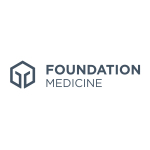
Both of Foundation Medicine’s FDA-approved genomic tests are now FDA approved to identify patients with metastatic non-small cell lung cancer harboring a BRAF V600E mutation who may benefit from treatment with BRAFTOVI® in combination with MEKTOVI®
CAMBRIDGE, Mass.–(BUSINESS WIRE)–Foundation Medicine Inc. today announced that it has received approval from the U.S. Food and Drug Administration (FDA) for FoundationOne®CDx and FoundationOne®Liquid CDx to be used as companion diagnostics for Pfizer’s BRAFTOVI® (encorafenib) in combination with MEKTOVI® (binimetinib) for the treatment of adult patients with metastatic non-small cell lung cancer (NSCLC) with a BRAF V600E mutation.
Non-small cell lung cancer is the most common form of lung cancer, accounting for 80-85% of lung cancer diagnoses.1 BRAF V600E mutations occur in approximately 2% of NSCLC cases.2 BRAFTOVI and MEKTOVI are kinase inhibitors, which are a kind of targeted therapy that work by blocking enzymes and keeping cancer cells from growing.3 This therapy combination was previously approved for the treatment of patients with unresectable or metastatic melanoma with a BRAF V600E or V600K mutation, as detected by an FDA-approved test.
These companion diagnostic approvals mark the first simultaneous approval of both Foundation Medicine’s FDA approved tests as companion diagnostics for the same therapy. Both tests can help determine if BRAFTOVI in combination with MEKTOVI is an appropriate treatment option for certain patients. Foundation Medicine is the only company with an FDA-approved portfolio with tissue and blood-based comprehensive genomic profiling tests.
Using a tissue sample, the FDA-approved FoundationOne CDx test analyzes more than 300 cancer-related genes for genomic alterations in a patient’s tumor. The test currently has over 30 companion diagnostic indications. From a simple blood sample, FoundationOne Liquid CDx analyzes more than 300 cancer-related genes to provide genomic insights. The test has several companion diagnostic indications across NSCLC, breast cancer, and colorectal cancer, plus a pan tumor indication specific to NTRK1/2/3 fusions.
Foundation Medicine is the global leader in companion diagnostic approvals. The company has 60% of all U.S. companion diagnostic approvals for next generation sequencing (NGS) testing.
“Foundation Medicine’s FDA-approved companion diagnostic tests offer physicians a high-quality diagnostic tool to support their personalized treatment planning,” said Mia Levy, MD, PhD, chief medical officer at Foundation Medicine. “We are thrilled to see both tests approved simultaneously for the same indication, which will expand access to this therapy option to more NSCLC patients who harbor a BRAF V600E mutation.”
“We are grateful to see continued efforts to develop more treatment options for patients facing a non-small cell lung cancer diagnosis” said Danielle Hicks, Chief Patient Officer at GO2 for Lung Cancer. “It’s especially exciting to see that patients can be matched to this combination therapy from either a blood or tissue-based test, which expands avenues for more access to this treatment option.”
About Foundation Medicine: Your Essential Partner in Cancer Care
Foundation Medicine is a pioneer in molecular profiling for cancer, working to shape the future of clinical care and research. We collaborate with a broad range of partners across the cancer community and strive to set the standard for quality, scientific excellence, and regulatory leadership. Our deep understanding of cancer biology helps physicians make informed treatment decisions for their patients and empowers researchers to develop new medicines. Every day, we are driven to help our partners find answers and take action, enabling more people around the world to benefit from precision cancer care. For more information, please visit us on www.FoundationMedicine.com and follow us on Twitter and LinkedIn.
About FoundationOne CDx
FoundationOne CDx is a next-generation sequencing based in vitro diagnostic device for detection of substitutions, insertion and deletion alterations (indels), and copy number alterations (CNAs) in 324 genes and select gene rearrangements, as well as genomic signatures including microsatellite instability (MSI) and tumor mutational burden (TMB) using DNA isolated from formalin-fixed, paraffin-embedded (FFPE) tumor tissue specimens. FoundationOne CDx is for prescription use only and is intended as a companion diagnostic to identify patients who may benefit from treatment with certain targeted therapies in accordance with their approved therapeutic product labeling. Additionally, FoundationOne CDx is intended to provide tumor mutation profiling to be used by qualified health care professionals in accordance with professional guidelines in oncology for patients with solid malignant neoplasms. Use of the test does not guarantee a patient will be matched to a treatment. A negative result does not rule out the presence of an alteration. Some patients may require a biopsy. For a full list of targeted therapies for which FoundationOne CDx is indicated as a companion diagnostic, please visit www.F1CDxLabel.com.
About FoundationOne®Liquid CDx
FoundationOne®Liquid CDx is for prescription use only and is a qualitative next-generation sequencing based in vitro diagnostic test for advanced cancer patients with solid tumors. The test analyzes 324 genes utilizing circulating cell-free DNA and is FDA-approved to report short variants in 311 genes and as a companion diagnostic to identify patients who may benefit from treatment with specific therapies (listed in Table 1 of the Intended Use) in accordance with the approved therapeutic product labeling. Additional genomic findings may be reported and are not prescriptive or conclusive for labeled use of any specific therapeutic product. Use of the test does not guarantee a patient will be matched to a treatment. A negative result does not rule out the presence of an alteration. When considering eligibility for certain therapies for which FoundationOne Liquid CDx is a companion diagnostic, testing of plasma is only appropriate where tumor tissue is not available. Patients who are negative for other companion diagnostic mutations should be reflexed to tumor tissue testing and mutation status confirmed using an FDA-approved tumor tissue test, if feasible. For the complete label, including companion diagnostic indications and complete risk information, please visit www.F1LCDxLabel.com.
Source: Foundation Medicine
1 American Cancer Society. What is Non-Small Cell Lung Cancer? https://www.cancer.org/cancer/non-small-cell-lung-cancer/about/what-is-non-small-cell-lung-cancer.html
2 American Lung Association. BRAF and lung cancer. Updated November 17, 2022. Accessed August 16, 2023. https://www.lung.org/lung-health-diseases/lung-disease-lookup/lung-cancer/symptoms-diagnosis/biomarker-testing/braf
3 Cleveland Clinic. Tyrosine Kinase Inhibitors. https://my.clevelandclinic.org/health/treatments/24984-tyrosine-kinase-inhibitors
Contacts
Foundation Medicine:
Abigail Linehan, 781-534-3210
[email protected]




